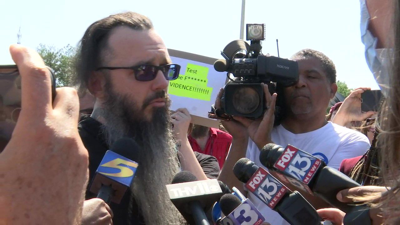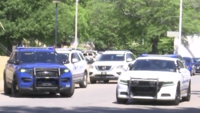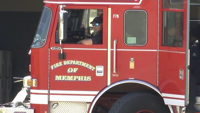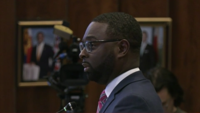A Crittenden County Judge has denied Damien Echols' request to order prosecutors to hand over DNA evidence to a lab for testing.
Echols appeared in a West Memphis courtroom on Thursday morning.
PHOTOS: Judge denies Echols' request for new DNA tests on West Memphis 3 evidence
Echols, along with two others, was accused of murdering three boys in the early 1990s. The suspects were teens at the time.
It's been almost three decades since the bodies of three boys were found stripped naked and hogtied in a ditch in West Memphis.
Echols, along with Jessie Misskelley, Jr. and Jason Baldwin, was convicted of the crime.
He was sentenced to death row and released in 2011, along with the other two defendants.
Last December, Echols' legal team said they tried for 18 months to review evidence that was thought to be lost. However, that evidence was later found intact, cataloged, organized, and ready for further DNA testing.
MORE: Damien Echols' legal team reviews ‘lost' evidence in 1993 West Memphis murder case
When FOX13′s crew arrived at the West Memphis courthouse Thursday morning, crowds of people were lined up outside.
Echols and his legal team were seen entering the building.
Police later asked the crowd and media to move back toward the parking lot.
Judge Tonya M. Alexander said Echols' petition was denied because it fell under a habeas statute. In Arkansas, a person can only bring a habeas petition if they are in custody. You cannot bring one if you aren't in custody, even if you have a conviction on your record.
An attorney for Echols said that just because he is free doesn't mean he should be denied additional DNA testing.
At this time, Arkansas law doesn't allow that to happen.
Judge Alexander said if state legislators pass another law to change that, the decision could potentially be overturned.
FOX13 spoke with Echols and his attorney, Patrick Benca, as they left the courtroom, and they said they are upset with Thursday's outcome and very disappointed in the decision.
But they said their fight is not over. They will continue to do what they can to get the DNA tested.
"It felt like they would rather nitpick at aspects of the law than find out who actually killed these children," Echols said.
Almost 11 years ago, Echols and the two other men convicted in the murders walked out of prison. They were not exonerated.
Instead, they entered Alford pleas, which means they maintained their innocence but acknowledged there was enough evidence to convict them.
On Thursday, Echols and his attorney hoped to get permission to use new technology to test for DNA on ligatures found on the victims.
"We didn't ask for a petition for habeas corpus. That wasn't our argument. Our argument (was) for further DNA testing," Benca said.
The judge said she could not grant that request, citing an Arkansas statute that requires anyone petitioning for new DNA testing still be in prison.
"Her concern seems to be with the fact that the legislature is not passing laws that would allow Damien and the others to be able to actually find themselves in a situation to be completely exonerated even though they have been released from custody," Benca said.
Benca said they plan to appeal.
Until then, Echols says the fight to clear his name will continue.
"There are so many people behind this case right now. They want to know the truth. The momentum of that is going to keep carrying it forward, whether I am a part of it or not," he said.
Echols's attorney said he strongly believes the evidence he has can exonerate all three men.
He said the evidence is in good shape and well documented, although initially they were told the evidence had been destroyed in a fire.
Jason Baldwin, another member of the West Memphis three, was also outside the courtroom on Thursday.
He said he and his attorney are also working on getting him exonerated and are discussing the best way to proceed.
He also talked about the program he cofounded called Proclaim Justice.
He said it's an online platform to help other people who have been wrongfully convicted.
Echols said how much he appreciated the people who traveled to West Memphis to support him and push for exoneration from his murder conviction.
"This case is where it is right now because of the public hearing behind it," he said. "That's the only reason I'm not dead, it's the reason I'm standing here today, because people all over the world cared about this case. Those are the same people today who want to see this DNA tested."
Sarah Wickham and Rebecca Maness drove eight hours to West Memphis from Anderson, South Carolina for the hearing.
Both said they have followed the case for a while.
Some people in the crowd said they want to the person(s) responsible for killing the three boys to be held accountable.
Echols and his team plan to continue fighting to get the DNA evidence tested.
MORE: Man convicted in connection to ‘West Memphis Three' learns case evidence is missing
Below is a timeline of the case:
May 5, 1993 - Steve Branch, Michael Moore, and Christopher Byers all disappeared and were last seen riding their bikes together in West Memphis.
May 6, 1993 - Boys' bodies found in a drainage ditch
June 3, 1993 - Police arrest 18-year-old Damien Echols, 16-year-old Jason Baldwin, and 17-year-old Jessie Misskelley. They charge each with three counts of capital murder.
February 5, 1994 - Misskelley was convicted of one count of first-degree murder and two counts of second-degree murder. The court sentenced him to life plus 40 years in prison.
March 19, 1994 - Echols and Baldwin were found guilty on three counts of murder. The court sentenced Echols to death and Baldwin to life in prison.
2007 - DNA collected from the crime scene was tested. None was found to match DNA from Echols, Baldwin, or Misskelley.
October 29, 2007 - Papers were filed in federal court by Echols's defense lawyers seeking a retrial or his immediate release from prison.
November 4, 2010 - The Arkansas Supreme Court ordered a lower judge to consider whether newly analyzed DNA evidence might exonerate the three.
August 19, 2011 - Echols, Baldwin and Misskelley were released from prison as part of an Alford plea deal, making the hearings ordered by the Arkansas Supreme Court unnecessary.
December 21, 2021 – Echols' attorneys finally got access to the evidence they believe can exonerate all three men. They say the evidence is in good shape and well documented, although initially they were told the evidence had been destroyed in a fire.
June 23, 2022 - Hearing
























